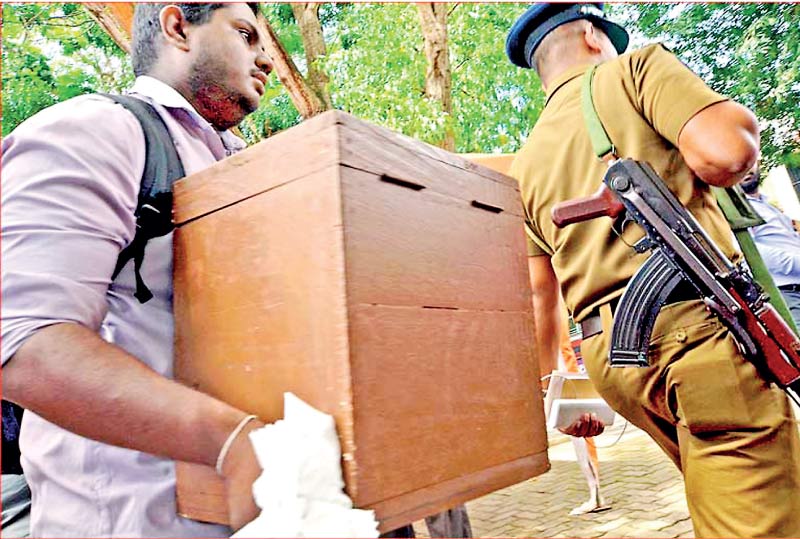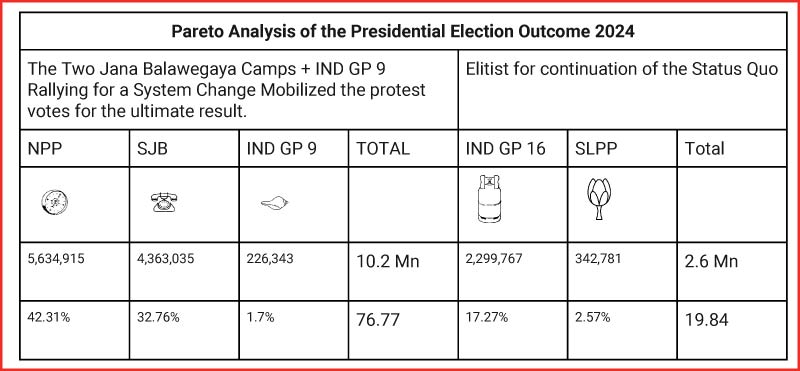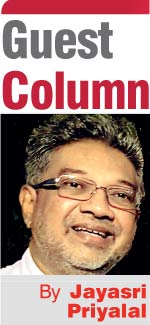Saturday Feb 21, 2026
Saturday Feb 21, 2026
Monday, 28 October 2024 00:42 - - {{hitsCtrl.values.hits}}

President AKD possessed the personality to appeal to the voters to cast their choice, but NPP must face the parliamentary election sans the popularity brand of AKD – Pic by Shehan Gunasekara

|
 Pareto Analysis is a decision-making tool based on the Pareto Principle, also known as the 80/20 rule. This principle suggests that roughly 80% of effects come from 20% of causes. Pareto principle is a good guide useful to analyse causes and effects of the 9th Presidential election results held on 21 September 2024 in Sri Lanka. Exit polls predicted 28% votes gain for NPP, which rounded up with 43% votes polled, presumably further 15% complemented the tally from the protest votes of frustrated electorate of Rajapaksa and Wickremesinghe corrupt partnership and cemented the victory of President Anura Kumara Dissanayake.
Pareto Analysis is a decision-making tool based on the Pareto Principle, also known as the 80/20 rule. This principle suggests that roughly 80% of effects come from 20% of causes. Pareto principle is a good guide useful to analyse causes and effects of the 9th Presidential election results held on 21 September 2024 in Sri Lanka. Exit polls predicted 28% votes gain for NPP, which rounded up with 43% votes polled, presumably further 15% complemented the tally from the protest votes of frustrated electorate of Rajapaksa and Wickremesinghe corrupt partnership and cemented the victory of President Anura Kumara Dissanayake.
The Jana Balawegaya force that propelled the recent electoral shift to position President Anura Kumara Dissanayake as the 9th President of Sri Lanka was a culmination of protest votes of the 80% of the frustrated electorate in totality, who were determined to chase the 20% corrupt elitist who proclaimed to be the political pundits pretending to be the experts of rescuing the country bankrupted by them.
This writer opines that the seeds of Aragalaya movement with the GoHomeGota campaign culminated in the mobilisation of the protest wave headed by two political brands carrying Jana Balawegaya suffix. Namely National People’s Power (NPP) and Samagi Jana Balawegaya (SJB). 80% rallied with Jana Balawegaya and silenced the 20% corrupt elitist paving the way for a system change.
Election of President Anura Kumara Dissanayake as the 9th Executive President of Sri Lanka is a great consolation for those who fearlessly took to the street and joined the Go Home Gota campaign. A true son of a commoner from Thabuttegama who a part of the corrupt system was now tasked to initiate the necessary change for installing a functioning system to uplift the quality of life of the marginalised, vulnerable non-corrupt innocent people from the grasp of the corrupt elites who had been enjoying power at the expense of poor and destitute are now aspiring for a sigh of relief.
This essay aims to visualise how the electoral opinions ahead of the parliamentary election in November 2024 shapes the socio-political landscape in Sri Lanka henceforth.
No man or woman is greater than his or her task
A mammoth task is ahead of President AKD. Undoing the entitlement drives welfarist socio economic system. Which is not an easy task with varying degrees of expectations of different social strata. As a nation, most of the Sri Lankans are for a system change and the 80% of the Jana Balawegaya force need to be patient in realising their dreams. At this stage all Sri Lankans should stand in unity irrespective of their political opinions putting the country before all other priorities. Sticking with ideologies will not take the country forward, except understanding the reality and introducing the right strategies with essential structural changes.
Denouncing Marxism as NPP’s core ideology is a welcome move. It is also important to remember that debt burdened neo-liberal economic policies have ruined many economies. Sri Lankans need to invent an original socio-economic strategy that is unique with socialism at the core. Yet, the policy makers should not get saddled into failed policy tools of “Brahmin Socialism” propagated by economists and think tanks without understanding the ground reality.
All Sri Lankans owe a heartening appreciation towards the judiciary since the Aragalaya for standing with justice and delivering candid judgements proving professionalism and its unquestionable independence. Which was not to the liking of the politicians in power and expressed their surprises suspecting judicial cannibalism. But the 2024 Presidential election results prove the fact that the United National Party, the oldest political party in the country, has been cannibalised by its leader Ranil Wickremesinghe.
This writer opines that the deterioration trend of law and order paving the way for corrupt unsustainable privileges led to political culture emerging with the enactment of the 1978 constitution under the leadership of President J.R. Jayewardene. Since then, there was no rule of law taking precedence instead of the rule of lawyers who dismantled the order of the nation, from time to time in the name of democracy purely for state capture to remain in power. In the recent past we only witnessed the functioning of “Hora-Police” governments bankrupting the nation. Many of those governments consisted of policymakers who were professionally qualified lawyers.
President AKD deserves the credit for taking a few important critical steps such as appointing credible people to high offices of the Government. Amongst them is the appointment of IGP, a respected policeman and a rank constable to head the institution responsible to maintain the law and order of the country. Similarly, sacking the head of Sri Lanka’s State Intelligence Service (SIS), bringing the agency under police control from military control is a critical decision. Choosing the right horses for courses is a step in the right direction and is a praiseworthy achievement of President AKD in the short span into power. Similarly, he should give the right drums to the competent drummers to maintain the rhythm of the much-anticipated system change.
It is heartening to note that the Secretary General of the Constitutional Council is calling for an application to fill up the vacancy of the Director-General of the Commission to Investigate Allegations of Bribery or Corruption (CIAOBOC) by 28 October 2024. It is another consolation for those who aspired for a system change by holding the corrupt accountable for wrongdoing. In the current atmosphere, the Constitutional Council will have a tough time selecting the right person for the job.
The actions deserve commendation of the tasks so far accomplished by the President AKD, and the rest of the bucket list will unfold in the days ahead. Putting the Executive and Judiciary in the right path in a short period deserves commendation and appreciation for foresighted actions for the common good of the nation. President AKD has shown his integrity and proven his metal standing tall against many other tasks ahead. Now all Sri Lankans have the chance to elect a functioning government at the forthcoming parliamentary election on 14 November 2024. Although the Jana Balawegaya swing was high favouring the NPP at the Presidential election, getting the right mandate to form a government even with a simple majority at the parliamentary election will be a challenge. President AKD possessed the personality to appeal to the voters to cast their choice, but NPP must face the parliamentary election sans the popularity brand of AKD.
Stand for one right thing, or opt to fall for everything
Pareto analysis was cited at the beginning as a vital to apply to assess the degree of frustration amongst the marginalised and vulnerable groups in our society. This group was the dominant sector for the electoral gain of the NPP. It is worth remembering the phenomenon of reality: all revolutions start in the belly once in four hours when hunger triggers for action.
International donor agencies still estimate that nearly 23% of the population has been pushed into absolute poverty. The helpless schoolgirl drinking water with sugar to sustain life as circulated in social media is a true testimony. An island with an abundance of natural resources and a manageable population, nestled in the tropics grappling to provide basic needs for its population is unfortunate. This is the systemic failure that the policy makers need to address on a priority basis.
Addressing the burning issues of the marginalised poor, (දුකට පත්) due to lack of choice, 20% must be dealt with urgency. First and foremost, identifying these vulnerable groups is a challenge. Dishing out social welfare in the past as a privilege in exchange for political patronage must end. Shortcomings of the Samurdhi and Aswesuma must be handled with care. Social protection with taxpayers’ funds needs to be disbursed as direct cash transfer to the deserving. Classic example to follow from India as to how the Prime Minister Modi’s government used the digital technology with the biometrics to identify and implement the “Aadhar” scheme. All divisional secretaries have to be tasked to identify the most deserving 20% of those struggling to feed, specially living in the plantations, in the urban areas-working poor- and those who lost their businesses during the past few years, the Micro Small and Medium Entrepreneurs.
Poverty anywhere is a danger for prosperity everywhere – Philadelphia Declaration
The Sri Lankan electorate is quite capable of using their franchise intelligently. They did demonstrate their maturity in the Presidential elections candidly. People’s power to act fearlessly reoriented and well rooted in Sri Lanka with the Aragalaya movement in early 2022. Sri Lankans have proven peacefully that people’s power is always greater than those who get elected to hold power to the rest of the world. In the same spirit Sri Lankans will make the right choice in electing the next government on 14 November 2024.
This writer aspires the next administration under President AKD to be a national and unity government. It could be a Jana Balawegaya coalition to initiate the preliminary framework for meaningful stakeholder consultations with transparent social dialogues. The famous Philadelphia Declaration of 1944 cited as the sub-heading to caution as to how hunger and poverty can become a tide against the governments in power. Unless the policy making targets bringing in incremental changes to address the issues confronted by those bottoms 20% of the social pyramid, will stand in the way of bringing in the fundamental changes the majority of 80% of Sri Lankans aspire for. As reported in the media, poverty rates have nearly doubled to 23.4% of the population in 2024. A family of four needs an income of Rs. 100,000 per month to meet a minimum nutritional intake of 2030 kcal per day. These 20% will have the capacity to change the direction of the people’s mandate to govern.
Right diagnosis of the compelling causes is half of the solution
No doubt for swing opinions at the elections political parties follow the strategy to kindle the emotions of the voters through anger—hope—leading to actions. Accusing opponents with various corruption allegations and personal weaknesses dominates election campaigns everywhere in the world. Most of the elections are now won by managing the misinformation effectively through social media. Frustrated, marginalised and vulnerable groups’ expectations remain at a very high level. The current fiscal limitations limit extending any worthwhile assistance. Hence those who are keen to stabilise the economy need to address the issues with practical solutions before they run out of patience.
Thus, whoever gets the mandate to form the next Government needs to identify the structural problems that hinder the strengthening of the producers and the consumers who are the important pillars in the real economy which drives the growth. Moreover, they need to come up with incremental policy changes mainstreamed first and come up with the critical fundamental policy changes embedded with the necessary structural changes at a gradual pace.